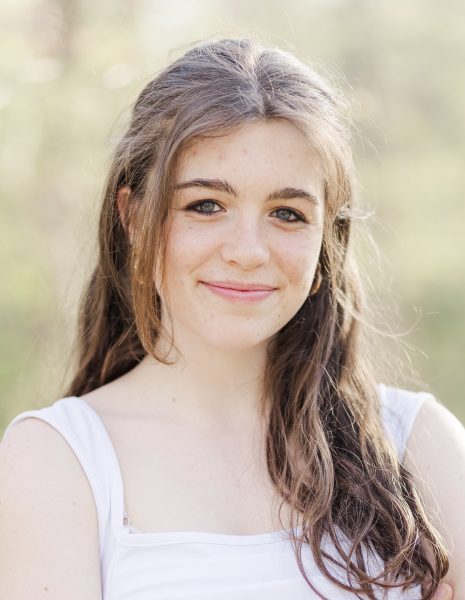For this article, 86 students at the U completed a survey on their experiences with religion on campus. These respondents will remain anonymous unless they opted for an interview.
Religious Identification and Identity
According to the survey, 51.2% of student respondents are atheist or agnostic. Half of these 44 students identified as atheist and the other half identified as agnostic.
The Church of Jesus Christ of Latter-day Saints was the second most common identification, making up 11.6% of the respondents. This was followed by Catholic and non-denominational Christianity, each at 7%.
Other denominations of Christianity made up an additional 10% of the respondents. This was followed by smaller numbers of other religious identities including Buddhist, Jewish and Muslim.
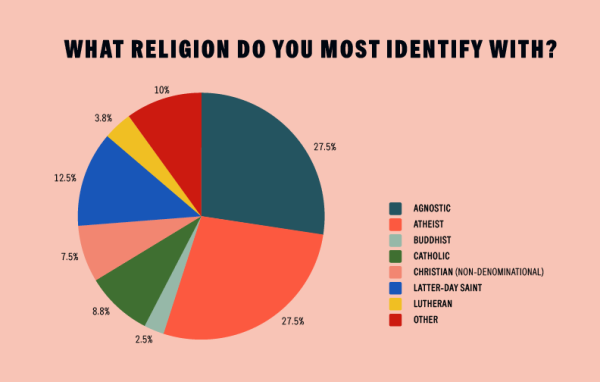
Respondents were asked to identify how important religion is to their identity on a scale of 1 to 5, with 1 being not important and 5 being very important. For this, 29.1% of participants said religion was not important to their identity, while 20.9% said it was very important. The remaining half of respondents put themselves somewhere in between.
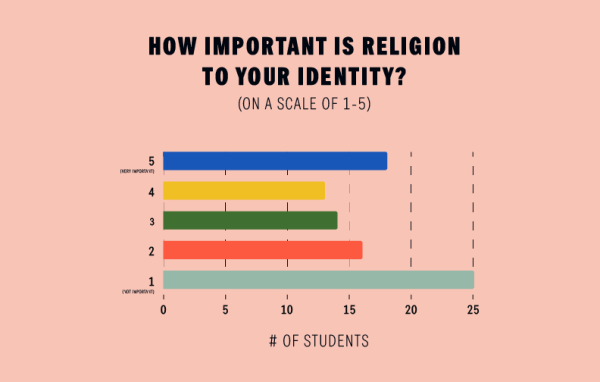
Friends and Social Interaction
The survey also asked how comfortable students feel interacting with peers of different backgrounds. About 54.7% of the respondents reported interactions with those of different faiths easy, with the remainder expressing feelings of mild unease to total discomfort.
Approximately one third of respondents said it was easy to find friends with the same religious beliefs, while the remainder expressed some challenges in doing so.
In terms of having friends of different religious backgrounds, about two thirds of respondents chose a 3 or a 4, indicating most respondents have some friends from different religious backgrounds.
However, some students like James Vanlooy, who is Catholic and a sophomore at the U, find it difficult to have open discussions about religion with their peers due to polarized views.
“If you don’t fit into either the far right or, like, more of an Evangelical bubble, they don’t like you. If you don’t fit into the agnostic, atheist or liberal bubble, they don’t like you either,” Vanlooy said. “I feel like the university itself is secular, but the people in it tend to be either very religious or opposed to the idea of religion.”
Another respondent shared their experience as a non-member of the Church of Jesus Christ of Latter-day Saints.
“I was raised Lutheran in Utah and was bullied relentlessly for not being LDS like my peers,” they said. “Other non-LDS students around me tended to lean hard in the opposite direction: they acted out at every opportunity to prove they were different, and their behavior was often dangerous as a result.”
Alexa Godfrey is a freshman at the U who grew up in a primarily non-religious household but is now a practicing non-denominational Christian. She said she found comfort in surrounding herself with like-minded peers.
“I would specifically say it’s a big deal to be around other Christians, because, you know, they can help you, especially if they’re ahead in their faith,” Godfrey said. “They can help you through things you’re going through.”
Marcus Tanner, a student in his fifth year at the U who is a polytheist, mentioned a similar love for his religious community.
“This focus on community despite personal differences is one thing that I love about pagans and the community as a whole, and any pagan community worth their salt will welcome anyone that comes in good faith and returns that attitude towards new members,” Tanner said. “Life’s too short and people are far too interesting to be exclusionary, and I think that’s a message we could all stand to live by more often.”
Resources at the U
The majority of survey respondents do not engage with religious clubs on campus, at 75.6%. Some of the organizations which students reported being involved with include Chi Alpha Christian Fellowship, Institute of Religion, Catholic Newman Society, Buddhist Sangha, LDSSA, Muslim Students Association, Chabad, Hillel Utah and InterVarsity.
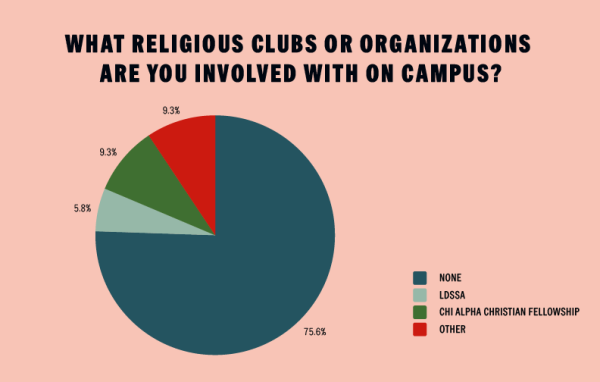
In the survey, students were asked what religion-related resources they would like to see on campus. Many of the atheist/agnostic-identifying respondents detailed a secular space or club.
Other students, such as Hope Gale-Hendry, who is a doctoral student at the U and co-founder of the Intersectional Buddhist Sangha, wanted dedicated spaces for students of minority religions.
“I think the university is still learning how to support non-Christian students,” Gale-Hendry, a practicing Buddhist, said. “The events I’ve been to so far as a religious organizer at the U, non-Christian students, including myself, have been very marginal. My experience is seeing how much of a need there has been for a Buddhist and mindfulness community … students just keep coming back because the teachings and practice speak to them.”
Many mentioned interfaith associations or resources for those in a faith crisis or with religious trauma. There were also requests for progressive Christian groups, as well as informative resources about different religions that do not pressure students to convert.
Tyson Guymon, a freshman at the U who is a member of the Church, finds the current resources at the U satisfactory. He regularly participates in activities at the Institute because it has “provided a good social place” for him, particularly during his first year at the university.
He later said that the prominence of his faith on campus impacts the resources offered.
“I think, as someone who’s LDS, we have a great advantage where we have so many of us who practice this faith,” Guymon said. “And I don’t know about other religions, but I can easily see religions that don’t have a lot of people would be feeling even more isolated.”
One Jewish student echoed Guymon’s sentiment, noting that Jewish student organizations like Chabad and Hillel provide valuable spaces for religious practice and community.
“We feel safe and supported there, and we can practice freely without interference,” the student said.
Another Jewish respondent described the challenges of organizing events due to antisemitism.
“People publicly announce and emphasize that they hate Jewish people; I do not see a genuine hate for other religions,” the student said. “For some religious events, we need security guards to guard the place of worship in case there is an antisemitic person/people attempting to enter or even threaten us.”
Treatment and Questioning
Although almost 70% of students said they have never felt discriminated against on campus due to their religious identity, many cited experiences with assumptions being made about them based on their beliefs.
“It’s easy for people to learn that you practice a religion and make assumptions about you — both positive and negative,” Guymon said. “If someone has had negative experiences with religion, it can be easy to project those assumptions onto others.”
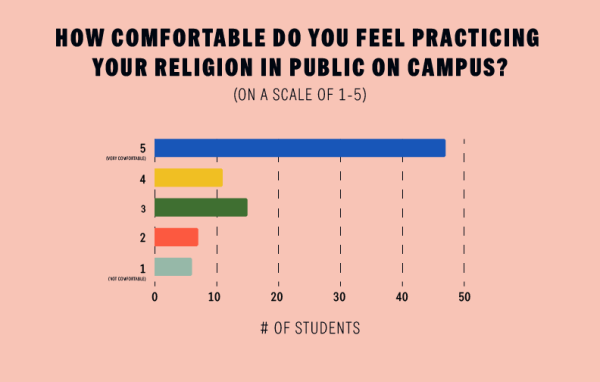
Godfrey shared similar experiences, specifically with assumptions that Christians may harbor anti-LGBTQ+ views.
“I understand why, because there are many Christians who have shown hate to that group of people, and that’s ridiculous,” Godfrey said. “I wish [people would not presume] … but not everybody is willing to change the way they act towards other people.”
Tanner described “feeling unsafe” as a polytheist in his survey response.
“I get a lot of hostile/fearful looks and comments when I say I’m polytheist, as though my beliefs were morally wrong,” Tanner wrote. In his interview, he added, “We’re not trying to turn people away from what they believe. We just want to be in peace and share our culture with people who want to learn more in good faith.”
Comparison to Utah as a Whole
Many respondents grew up in Utah, which was about 42% Latter-day Saints in 2023. Some described their experience in other parts of the state compared to their time at the U.
“I feel like the university itself is secular, but the people on it tend to be either very religious or opposed to the idea of religion,” Vanlooy said. “If you’re not trying to convert the people, you’re wrong, and if you are just religious, you’re just wrong. I wish there was more of a middle ground.”
Guymon described a similar sentiment, wanting an environment where people feel free to discuss their beliefs without fear of being “ostracized.”
“I think that as people of faith, we have a lot that we can agree on, and a lot we can learn from each other,” Guymon said.
Felix Elias Keil, sophomore at the U who is an atheist, pointed out the presence of religious booths on campus.
“Trying to convert people at, like, the most liberal campus in Utah is kind of funny, to be honest,” Keil said.
According to the survey, 70.9% of respondents said they did not question their faith during their time at the U, while 29.1% said the opposite. One student discussed the U’s religious diversity as the reason for exploring other faiths.
“Being exposed to so many people from different backgrounds regarding faith, I was bound to question my faith,” they said. “Especially with different Christian denominations. I’ve grown more open-minded to different ways of worshiping. It looks different for everyone. And I enjoy the way I’ve always worshiped; even if I have questioned it, I feel it’s only grown stronger.”
Some students also commented on the limitations of survey questions like, “What religion do you most identify with?” pointing out that the “Abrahamic framing” of the question may not reflect how some people experience religion.
“My understanding of other religious traditions is that hybridity or practicing different faiths is more the norm,” one respondent said. “Religion can be much more muddled for many people.”



